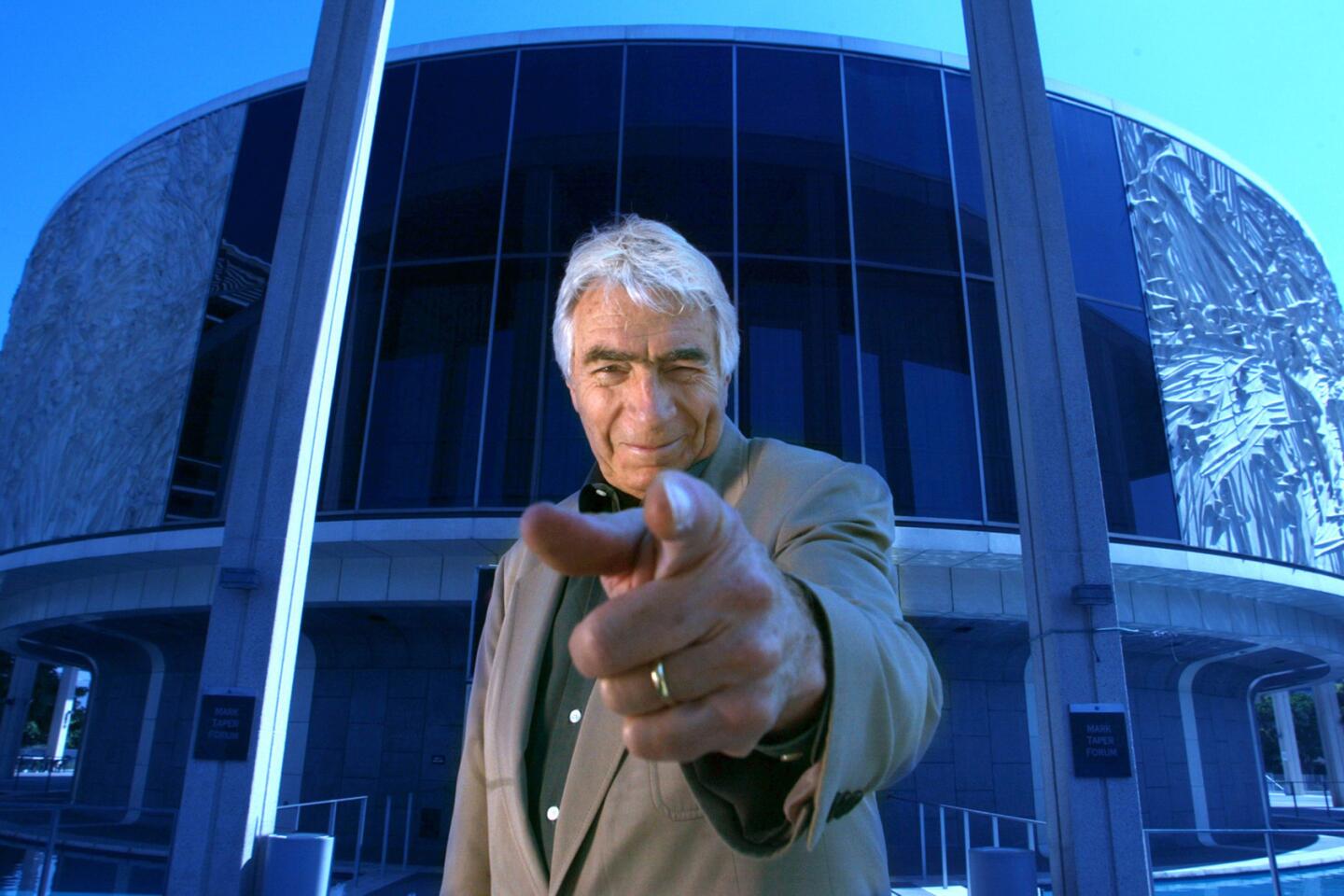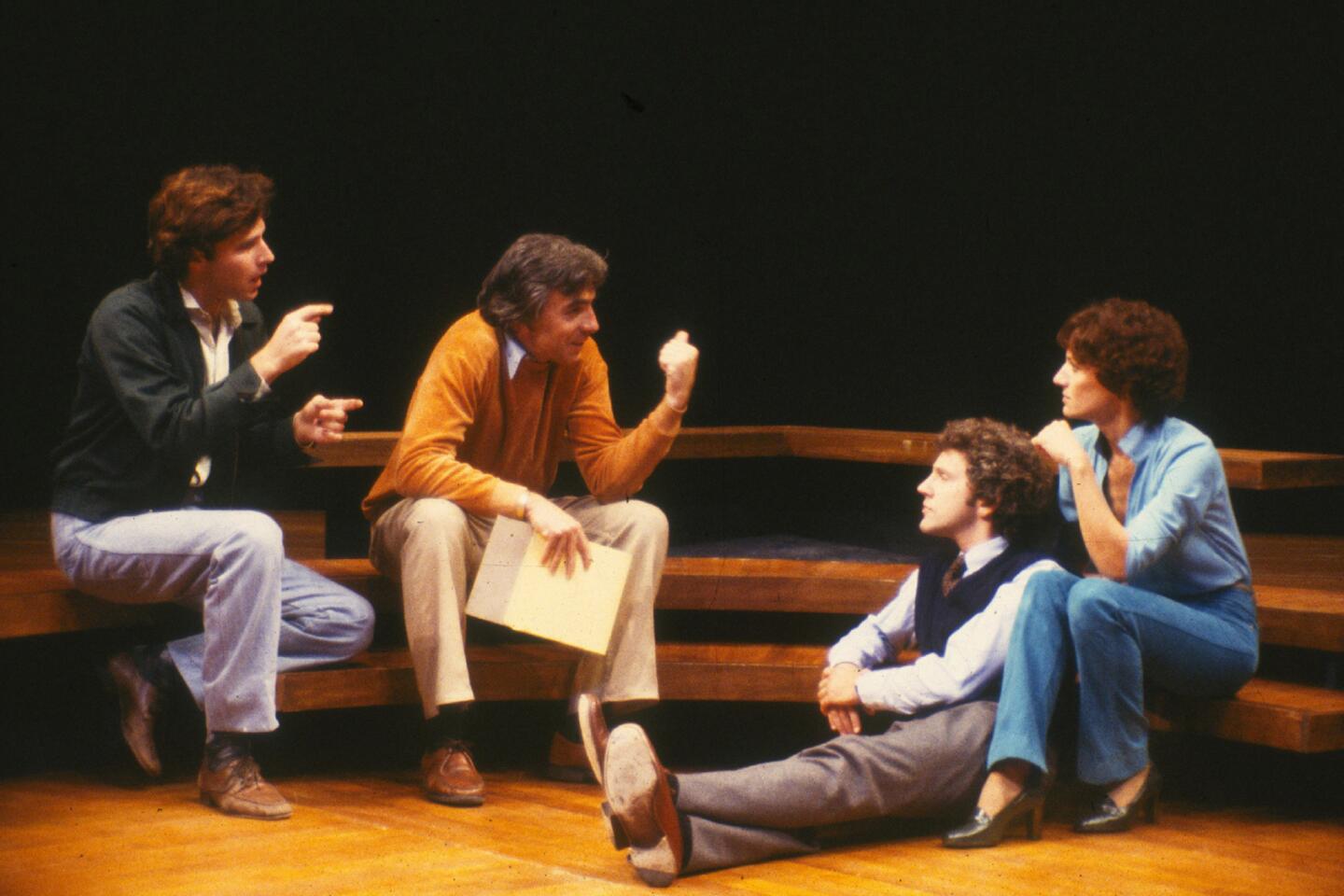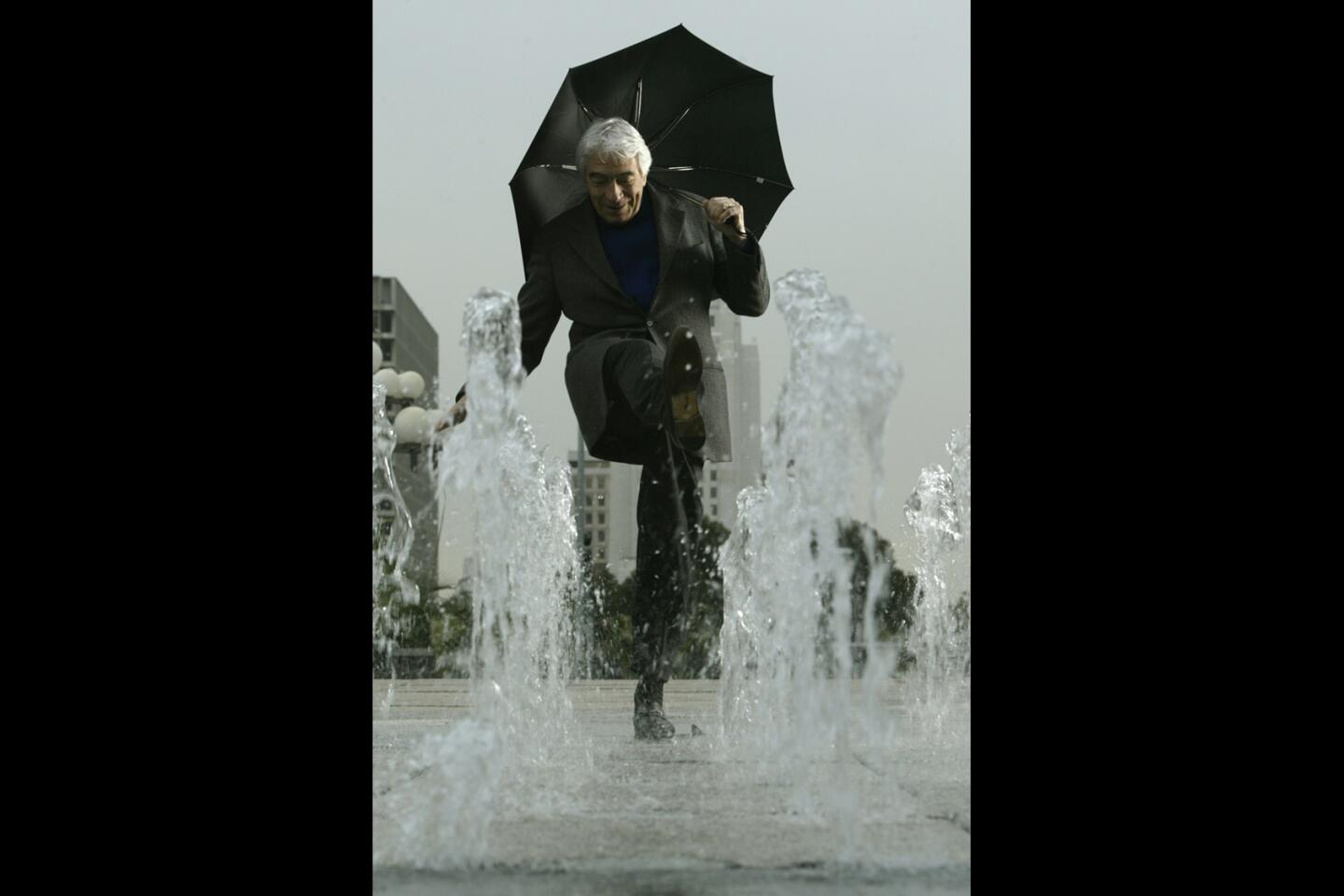Playwrights recall the spirit of Gordon Davidson, and how one man changed the face of L.A. theater
- Share via
Gordon Davidson’s risk-taking attracted some of the world’s greatest stage artists to Los Angeles, but for many in the city, no collaboration was as significant as when he worked with Luis Valdez, the writer of the historical drama “Zoot Suit.”
The 1978 play recounted a contentious period in L.A. history: the 1942 Sleepy Lagoon case, in which a group of Mexican American men were unjustly convicted of murder, and the Zoot Suit riots that followed. “Zoot Suit” became one of the Mark Taper Forum’s landmark productions.
“Chicano theater had existed for a few years but no one in the professional theater reached out to us the way Gordon did. It was a form of acceptance,” Valdez said Monday. The play ran for nearly a year at the Taper and at another venue in Hollywood due to popular demand.
“It established the Taper as a theater for all Angelenos,” Valdez said.
Davidson, the Taper’s founding artistic director who went on to direct and produce dozens of stage productions for Center Theatre Group, died Sunday at 83. As news of his death spread, collaborators and friends remembered Davidson as a generous but demanding producer who almost single-handedly turned L.A. into an important theater town — not just for well-heeled patrons but also for marginalized communities that previously saw theater as rarified territory.
Davidson sought out challenging plays with political arcs and reached out to local, relatively unknown playwrights.
“He was a champion of artists who wrote little plays, and he put them on the big stage. Hundreds of people saw them — not just audiences of 99 people,” said Charlayne Woodard, the actress and playwright. “He was living diversity before anyone started bandying the word about.”
At the same time, he was a task master capable of challenging artists. Woodard recalled that Davidson asked her to rewrite one of her plays just a few days before opening night. “He never minced words. He was quite demanding — but isn’t that what an artist needs for challenge? He took chances on people and changed their creative lives.”
Before the Taper was founded in 1967, L.A. saw little in the way of home-grown productions of significant artistic merit, said Madeline Puzo, former dean of USC’s School of Dramatic Arts. She worked for Davidson for close to three decades at CTG.
“That was the big gift Gordon brought to L.A.,” she said. “He believed theater was a crucible to explore dangerous topics that had social impact.”
Davidson commissioned and produced the world premiere of “Twilight: Los Angeles, 1992,” the solo show by Anna Deavere Smith about the L.A. riots. On Monday she called him “an emblem.”
“He not only believed in artists but also his community,” said Smith, who interviewed more than 250 people for the play. She said Davidson helped her gain access to individuals including L.A. Police Chief Daryl Gates and actor Charlton Heston.
“Anything was possible, and Gordon’s reach was very long into the community,” she said. “He was such a civic person.”
Davidson also wooed top playwrights to L.A. He worked with Christopher Hampton several times, including the commission for “Tales From Hollywood,” his 1982 drama about the German emigre experience in L.A. during World War II.
The play “owes its existence to all those stories he told me about the German emigres who passed through his home,” the Oscar-winning writer recalled. “That play grew organically out of my relationship with him.”
Davidson produced the U.S. premiere of Hampton’s “The Talking Cure,” about the relationship between Sigmund Freud and Carl Jung, at the Taper in 2004. The play was adapted for the screen by David Cronenberg as “A Dangerous Method.”
As a theater director, Davidson staged Mark Medoff’s “Children of a Lesser God,” winning a Tony Award in the process. The play about a deaf woman’s relationship with a hearing teacher was a commercial hit in L.A. and ran for more than a year on Broadway. It was made into an Academy Award-winning movie in 1986.
“In American Sign Language he was ‘GD,’ always signed with affection and respect,” recalled Robert Steinberg, a cast member of the production and husband of the late actress Phyllis Frelich, who won a Tony for playing the lead role.
Some of Davidson’s colleagues have gone on to lead major theatrical companies. Davidson’s No. 2 in command, Robert Egan, worked as producing artistic director at the Taper for 20 years until 2003, directing plays and creating the New Work Festival. He now serves as artistic director of the Ojai Playwrights Conference.
“Everything great that ever happened for me in the theater ties back to the day we met and I went to work at the Taper,” recalled Thomas Schumacher, head of Disney Theatrical Productions in New York, in a statement sent to The Times.
Oskar Eustis, the head of the Public Theater in New York, worked with Davidson when “Angels in America” was produced at the Taper.
“Everything I’ve learned, I’ve learned from him — any success I had in my career belonged to him, and it started with ‘Angels in America,’” he said.
Richard Stayton, a theater critic for the L.A. Herald Examiner during Davidson’s tenure at the Taper, said he didn’t think the Taper and Davidson got as much credit as they deserved for nurturing “Angels” into the work it eventually became.
“It wouldn’t have been what it became with it,” Stayton said of the Taper. “And Gordon was the phantom behind it all.”
The thing about Davidson, he said, was that “he was such a maestro of bringing talent in, and I think people didn’t always recognize how good he was at that.”
The actor Alan Mandell, who said he had dinner with Davidson about a month ago, recalled one measure of the Taper and Ahmanson leader’s reputation.
“If you were in New York, as I was for a long time, if you said you were doing a play at the Music Center in Los Angeles, you didn’t have to explain it to anyone,” Mandell said. “Everyone knew who that was and what that was: ‘You mean Gordon Davidson’s theaters.’”
Davidson remained active following his retirement in 2005, attending theater productions around town, teaching at USC and writing his memoirs. His wife, Judi Davidson, said his memoirs remain uncompleted.
Times staff writer Jessica Gelt contributed to this article.
More to Read
The biggest entertainment stories
Get our big stories about Hollywood, film, television, music, arts, culture and more right in your inbox as soon as they publish.
You may occasionally receive promotional content from the Los Angeles Times.














